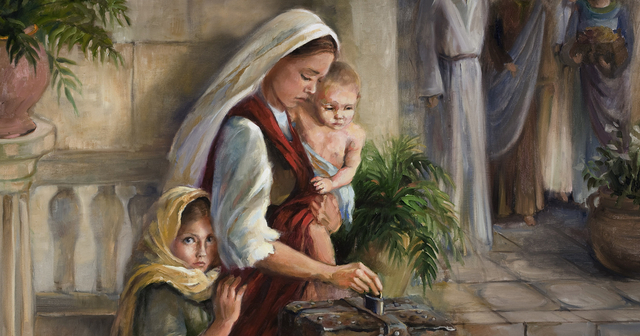I've often read about the "widow's mite" in the New Testament and thought that it was significant because she was poor and yet still acted obedient in keeping the law of the tithe. This in and of itself is a great example and a fine lesson, but today I understood it a little different.
You know the story:
42 And there came a certain poor widow, and she threw in two mites, which make a farthing.Being all in
43 And he called unto him his disciples, and saith unto them, Verily I say unto you, That this poor widow hath cast more in, than all they which have cast into the treasury:
44 For all they did cast in of their abundance; but she of her want did cast in all that she had, even all her living.
The key phrase that stood out to me is "[she] did cast in all that she had." The widow was all in with her faith and showed it by being all in with everything with which the Lord had blessed her. Are we all in with our faith? Do our daily choices reflect that? Can we be identified as a disciple by our fruits?
Some may think, "well, it's easier to be all in when you're poor." I propose that being all in is the same test and level of difficulty regardless of wealth, popularity, or prominence. In every circumstance it requires faith in the Lord's promised blessings.
The woman giving her all financially must trust completely on the Lord for sustenance. The rich woman giving her all financially would still have to trust completely on the Lord for sustenance, but that's not really what this is about. It's not about selling all that we have and giving to the poor, though that could be required of some; this is about the desires of our hearts.
What is the desire of your heart?
Being all in is giving your heart to the Lord. It all starts with the desires of your heart. King Benjamin told his people to "watch themselves" before telling them to watch their thoughts, words, and deeds. This is because words and deeds come from thoughts and thoughts come from desires. We must be willing to consecrate ourselves - all of our desires - to the Lord and allow Him to make much more of our lives than we ever could on our own.
Only one thing we can truly give
When the Lord owns our desires, the rest (thoughts, words, deeds) will automatically fall into place. We also learned from King Benjamin that we are and always will be unprofitable servants. Anything that we possess and give to the Lord was already his in the first place, except our will or the desires of our heart. God would never take away our agency, so it is truly the only gift that's ours to give.
In the eyes of God, the poor man who consecrates himself (his heart and soul) and everything he has to the Lord to build up His kingdom will always give more than the billionaire who donates millions to the same cause but stops short of fully consecrating his will and desires. This is how the widow's two mites infinitely dwarfs the thousands of mites donated by others. Jesus points her out as our example to follow.
Conclusion
Give your mite to the God by giving your whole self to Him. Kneel down and commit yourself, all the desires of your heart, to the Lord, and then go and do His will. This truly is the only offering you can possibly place on the alter; anything else was first given to you from Him. Be willing to give up anything and everything for God by loving Him first, and then show it with how you live each and every day.

